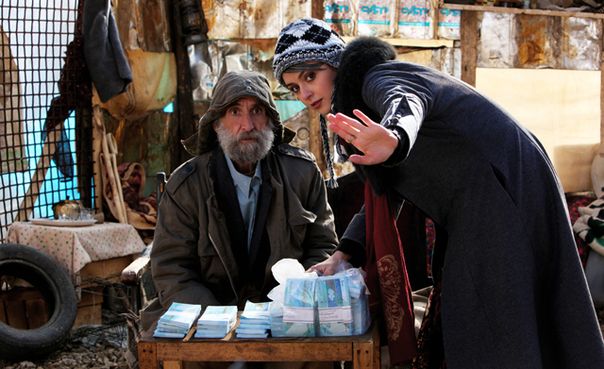Taste of Cheeky
From Berlinale Forum, Mani Haghighi's MODEST RECEPTION tackles serious issues with playful absurdity.

MODEST RECEPTION
What to do when you’re bored and bourgeois in Tehran? If you’re anything like Leyla and Kaveh – the protagonists in Berlinale Forum’s MODEST RECEPTION (PAZIRAIE SADEH, Iran) – the act of alms sounds like the perfect task, even if it ends up becoming mission: impossible. The two travel the alpine countryside, arguing feverishly like an old married couple as they plot ingenious ways of convincing impoverished mountain villagers to accept gifts – which they refuse out of “taarof” (Iranian social grace).
This Beckettian journey plays out like a sardonic ping-pong game between husband and wife, but while MODEST RECEPTION is one of the best recent examples of existential comedy, director Mani Haghighi leaves generous, deserved space for serious contemplation of their mission, and this invites comparisons to another Iranian existential masterpiece: TASTE OF CHERRY.
The two films may share the same philosophical framework, but it’s their similarity as Socratic exercises that binds them together – more so than their being Iranian productions. In TASTE the driver asks strangers to help bury him after his suicide, which forces his reluctant passengers (and the viewer) to question his motives. In MODEST RECEPTION, the couple is not so kind, often resorting to cruel, insensitive games to convince villagers, causing much mischief. In one painful scene Kaveh forces a truck driver to swear on the Koran that he will not share his money with his equally poor brother right in front of him.
Leyla and Kaveh are the ones forced to deal with the ethics of their increasingly nefarious cons, and the insensitive actions of one usually upsets the other, causing a rift between the two and making them question their comfortable, cosmopolitan lives.
In another sombre scene, Kaveh reaches a grieving father who is unable to dig up frozen ground in order to bury his deceased child. He convinces the father to leave the corpse behind and accept the money to at least feed his family. The man leaves offended and bewildered, but later Kaveh repents for his crass behavior, weeping for the child when others try to force him to leave the unburied baby to the hungry dogs. These acts of atonement balance out the couple’s conniving, blunt, devil's advocate approach and the film’s playful absurdity, and ultimately ground MODEST RECEPTION in the solemnity such themes deserve.


301 Moved Permanently